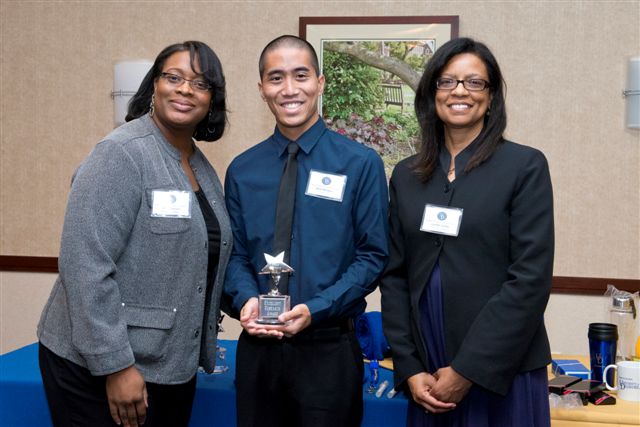Undergraduate's research on student perceptions of diversity at Virginia Tech wins award

Mark Managuio of Norfolk, Va., a senior majoring in political science and sociology in the College of Liberal Arts and Human Sciences, recently won the Research in Education Award at the University of Delaware’s 10th Annual National McNair Research Conference.
The McNair Scholars Program is designed to encourage and prepare undergraduate students for doctoral studies, who are either first-generation college students with financial need or students from groups currently underrepresented in higher education. The program gives selected students an environment of support to gain the necessary skills to move onto graduate school, through the use of workshops, faculty mentorship, academic and career support, and a summer research experience, among other benefits.
The conference is an opportunity for McNair Scholars from across the country to present their research. Each student participated in a poster presentation, which judges evaluated for awards.
In addition to Managuio, three other McNair Scholars from Virginia Tech presented their research:
- Emma-Aiyesha Ali of Springfield, Va., a senior majoring in international studies in the College of Liberal Arts and Human Sciences;
- Matthew Davis of Centreville, Va., a senior majoring in industrial and systems engineering in the College of Engineering; and
- Tamia Spells of Washington, D.C., a junior majoring in political science in the College of Liberal Arts and Human Sciences.
Managuio’s project focused on evaluating student perceptions of diversity at Virginia Tech. He used the summer to crunch the numbers from a recent campus climate survey, analyzing questions specifically related to diversity.
His results found students have a satisfactory view of diversity on campus and feel the university is supportive of individuals with diverse, ethnic backgrounds overall. However, Managuio explained, “As much as Virginia Tech has a focus on diversity and learning from people from other backgrounds, there may not be enough still.” He found students believe the university could be more active and intentional in creating an environment conducive to the learning and understanding of different dimensions of diversity.
Looking beyond the research project, Managuio hopes to use the results to promote change on campus by implementing new programs or initiatives.
“There seems to be a focus on diversity events in the spring,” he said. “There could be more events in the fall to give students more options to be involved and have an inclusive environment.”
“When Mark first started the McNair Scholars Program, he was unsure of what he wanted to do with his life, changing majors a few times,” said Mary Grace Campos, director of the McNair Scholars Program at Virginia Tech. “Through the program, his experiences, and research, he’s found a niche to pursue beyond his undergraduate education. That’s what we hope for all of our scholars.”
Diversity is a passion for Managuio and part of what attracted him to the McNair Scholars Program. “My own beliefs about higher education go along with the mission of McNair – preparing minority and underrepresented groups for graduate school. It’s something I push for on campus.”
Beyond academics, Managuio is on the board of the Filipino American Student Association and serves on Virginia Tech’s Commission on Equal Opportunity and Diversity. He is also an associate justice for the judicial branch of the Student Government Association.
Managuio hopes to pursue graduate study in higher education administration, either focusing on diversity and inclusion or academic and career counseling.
Dedicated to its motto, Ut Prosim (That I May Serve), Virginia Tech takes a hands-on, engaging approach to education, preparing scholars to be leaders in their fields and communities. As the commonwealth’s most comprehensive university and its leading research institution, Virginia Tech offers 240 undergraduate and graduate degree programs to more than 31,000 students and manages a research portfolio of $513 million. The university fulfills its land-grant mission of transforming knowledge to practice through technological leadership and by fueling economic growth and job creation locally, regionally, and across Virginia.




